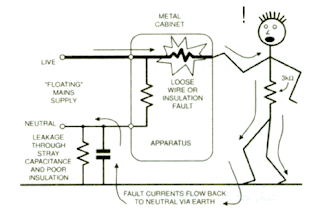Ever felt a little zap touching a doorknob? That's static electricity, a buildup of charge looking for an escape route. Grounding provides that escape, but does it actually neutralize the charge? Let's dive into the electrifying world of grounding and unravel this common misconception. We'll explore how it works, why it's crucial for safety, and how it impacts everything from your home wiring to lightning strikes.
Think of electrical charge like water seeking its level. When an object accumulates excess charge, it wants to balance out with its surroundings. Grounding offers a path of least resistance for this charge to flow, typically into the Earth, which acts as a giant reservoir of charge. This balancing act is key to understanding what grounding does.
So, does grounding neutralize charge? Not exactly. It's more accurate to say it dissipates or equalizes the charge. Instead of eliminating the charge entirely, grounding allows excess electrons to flow away or be absorbed until the object no longer has a significant charge difference compared to the earth. This is crucial because large charge imbalances can lead to sparks, shocks, and even damage to sensitive electronics.
The importance of grounding dates back to the early days of electricity. Benjamin Franklin, with his famous kite experiment, demonstrated the electrical nature of lightning and laid the groundwork (pun intended!) for using grounding rods to protect buildings. This understanding has evolved into the sophisticated grounding systems we rely on today for everything from power grids to consumer electronics.
The primary issue addressed by grounding is safety. Ungrounded electrical systems can pose a significant fire and shock hazard. By providing a low-resistance path to the earth, grounding prevents dangerous voltage buildup that could ignite flammable materials or cause a harmful shock if a person touches a faulty appliance.
Grounding, in essence, provides a safety net for our electrical systems. It’s the reason your toaster doesn't become a miniature lightning rod. By giving charge a safe place to go, grounding prevents dangerous voltage buildups.
A simple example is lightning protection. A lightning rod, connected to a grounding wire, provides a direct path for the immense electrical charge of lightning to flow into the earth, protecting the building from damage.
Benefits of Grounding:
1. Safety: Grounding minimizes the risk of electric shock by diverting fault currents safely to the earth.
2. Equipment Protection: Grounding safeguards electronic devices from damage caused by voltage surges and static discharge.
3. Stabilizes Electrical Systems: Grounding creates a stable reference point for voltage, enhancing the performance and reliability of electrical systems.
Implementing Effective Grounding:
Ensure all electrical outlets in your home have three prongs (including a ground wire). Use surge protectors for sensitive electronics. If you experience frequent shocks or suspect a grounding issue, consult a qualified electrician.
Challenges and Solutions:
1. Corroded Ground Wires: Solution: Replace corroded wires to ensure a reliable ground connection.
FAQ:
1. Does grounding eliminate charge? No, it equalizes charge with the earth.
Tips and Tricks: Periodically check your grounding system, especially after storms or electrical work.
Grounding isn't about magically making charge disappear; it's about providing a safe, low-resistance path for its dissipation. This seemingly simple concept is fundamental to electrical safety and the proper functioning of countless devices. From protecting our homes from lightning strikes to ensuring our computers run smoothly, grounding plays a vital role. By understanding the principles behind grounding and taking the necessary precautions, you can safeguard your property, your electronics, and most importantly, yourself. Embrace the power of grounding – it's an essential aspect of our electrified world.
What Does Grounding Electricity Mean - Trees By Bike
What is Neutralisation in Chemistry - Trees By Bike
does grounding mean neutralizing a charge - Trees By Bike
What Does Grounding Mean In Electricity - Trees By Bike
What does Grounding Yourself Mean Spiritually - Trees By Bike
What Does Grounding Yourself Mean Electricity - Trees By Bike
What is Grounding Electrical Currents - Trees By Bike
What Does Electrical Grounding Mean - Trees By Bike
What Does Grounding Do In Electricity - Trees By Bike
Chris Walton on LinkedIn stillness grounding calm alive leeds - Trees By Bike
What is Neutral Grounding - Trees By Bike
What Does Electrical Grounding Mean - Trees By Bike
What Does Grounding Mean - Trees By Bike
What Does Grounding Mean Electricity - Trees By Bike
Basic Electricity What Does Grounding or Grounded Mean - Trees By Bike














